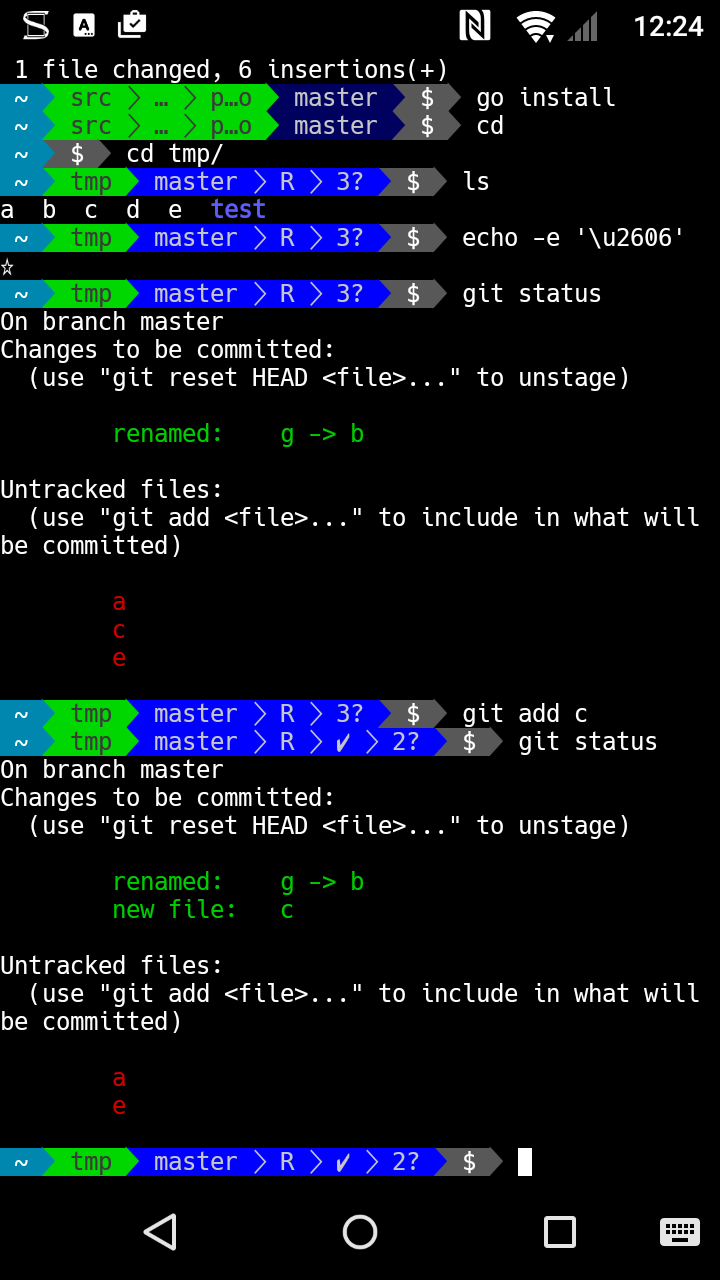Attempted fork of powerline-shell into Go
Install the binary with
go get -d github.com/scottweston/powerline-shell-go
go install github.com/scottweston/powerline-shell-go
Install powerline-shell-go and add the following to your ~/.bashrc
function _update_ps1() {
export PS1="$(powerline-shell-go bash $? 2> /dev/null)"
}
export PROMPT_COMMAND="_update_ps1; $PROMPT_COMMAND"
export LC_POWERLINE=1
Install powerline-shell-go and add the following to your ~/.zshrc
function powerline_precmd() {
export PS1="$(powerline-shell-go zsh $? 2> /dev/null)"
}
function install_powerline_precmd() {
for s in "${precmd_functions[@]}"; do
if [ "$s" = "powerline_precmd" ]; then
return
fi
done
precmd_functions+=(powerline_precmd)
}
install_powerline_precmd
export LC_POWERLINE=1
$ make [all|linux|osx|windows|clean]
Resultant binaries can be found under the build directory. By default make will
build all variants for all OS types.
The environment variable LC_POWERLINE is used to enable Powerline font support
otherwise powerline-shell-go will fallback to a plain mode. If you want this
variable available in remote hosts then in your ~/.ssh/config add the following lines:
Host *
SendEnv LC_*
And then on clients with Powerline fonts installed set the envvar LC_POWERLINE in
your shell of choice (e.g. echo export LC_POWERLINE=1 >> ~/.bashrc), this
way remote hosts can show fancy Powerline characters if your client supports it but
will otherwise fallback to a plain mode.
Configure the prompt via the file ~/.config/powerline-shell-go/config.json and
override as many or as few options as you like:
{
"showWritable": true,
"showVirtualEnv": true,
"showCwd": true,
"cwdMaxLength": 10,
"branchMaxLength": 12,
"batteryWarn": 20,
"showGit": true,
"showHg": true,
"showReturnCode": true,
"icons": {
"powerline": {
"ahead": "\u21d1",
"behind": "\u21d3",
"branch": "\ue0a0",
"conflicted": "\u203c",
"detached": "\u2702",
"ellipsis": "\u2026",
"phases": "+",
"readOnly": "\u2297",
"removed": "\u2716",
"separatorthin": "\ue0b1",
"separator": "\ue0b0"
},
"plain": {
"added": "A",
"ahead": "^",
"behind": "v",
"branch": "B",
"conflicted": "!",
"detached": "x",
"ellipsis": "...",
"modified": "M",
"phases": "+",
"readOnly": "X",
"removed": "D",
"separatorthin": "/",
"separator": "",
"untracked": "?"
}
},
"colours": {
"hg": {
"backgroundDefault": 22,
"backgroundChanges": 64,
"text": 251
},
"git": {
"backgroundDefault": 148,
"backgroundChanges": 161,
"text": 16
},
"cwd": {
"background": 245,
"text": 237,
"homeBackground": 220,
"homeText": 15
},
"virtualenv": {
"background": 35,
"text": 15
},
"returncode": {
"background": 196,
"text": 16
},
"lock": {
"background": 124,
"text": 254
},
"dollar": {
"background": 240,
"text": 15
}
}
}
Works just fine. You'll want to install
Termux and the
Termux:Styling
apps to select a Powerline font and update your ~/.bash_profile to include:
export LC_POWERLINE=1
function _update_ps1() {
export PS1="$(powerline-shell-go bash $? 2> /dev/null)"
}
export PROMPT_COMMAND="_update_ps1; $PROMPT_COMMAND"
To build simply install golang and build like normal:
$ apt-get install golang
$ export GOPATH=~
$ go get -d github.com/scottweston/powerline-shell-go
$ go install github.com/scottweston/powerline-shell-go
